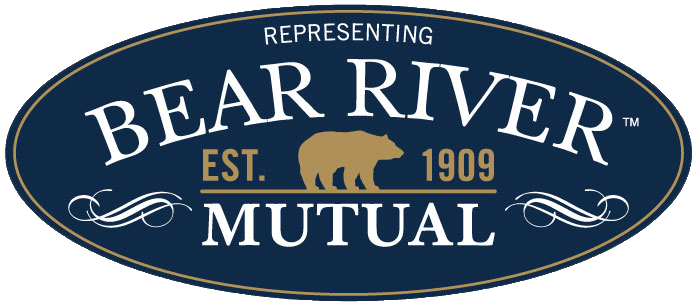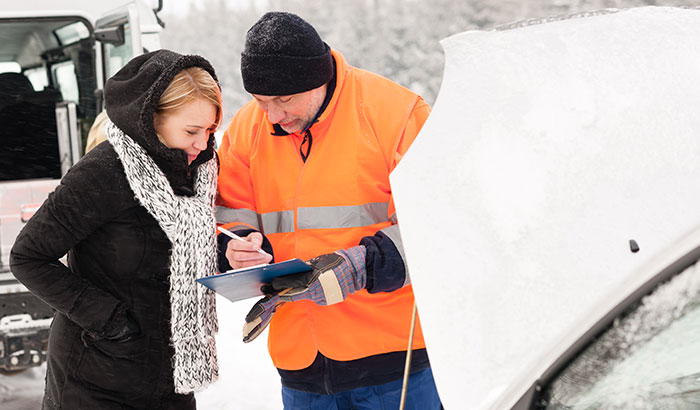If you are dreaming of a white Christmas or a snowy holiday season, having a quality auto insurance policy is key.
Between family occasions, work events, friend parties, school performances, and more, the holiday season is full of countless exciting things. While these gatherings will leave you and yours feeling shiny and bright, there’s a lot to keep in mind as you navigate the icy and snowy roads.
State and local agencies spend over 2.3 billion dollars on ice and snow control operations yearly — roughly 20% of the state’s Department of Transportation budgets! Despite this shocking figure, there are thousands of car crashes every winter season.
According to the United States Department of Transportation, 24% of weather-related car crashes happen on slushy, icy, or snowy asphalt, resulting in more than 1,300 people dying and nearly 117,000 injured. Fifteen percent of weather-related accidents happen during sleet or snowfall storms, leaving 76,000 injured and 900 without their lives.
It is illegal to operate a vehicle without auto insurance in the vast majority of states. And as these statistics illustrate, car insurance during the winter is even more crucial, especially to protect you and your car against ice and snow damage.
But what does your automobile insurance cover when it comes to snow damage? Continue reading to find out.
Auto Insurance and Snow and Ice Damage
Snow, sleet, ice, and other winter weather can cause many different car issues, such as hitting a guardrail, losing visibility, hitting black ice and losing control, or a snow and ice-laden tree branch falling on your car. Thankfully, comprehensive and collision insurance offers decent coverage for these winter woes.
Collision Coverage — Collision insurance will typically pay for car repair bills, such as crashing into a utility pole, fence, or another car, weather-related or not.
Comprehensive Coverage — Comprehensive insurance typically pays for weather-related damage that is not a car accident, like windshield chips that result in large cracks in fluctuating temperatures or falling objects, like a heavy tree limb. This coverage also covers other issues like vandalism, floods, theft, fire, and collisions with animals like deer.
The cost of collision and comprehensive insurance varies from state to state, provider to provider, and policy to policy. Both of these coverage types are optional policies. However, if you have a loan on your car or it’s a lease, your lender or the leasing company will likely require you to purchase comprehensive and collision insurance coverage.
What About Black Ice? Will Car Insurance Cover Those Accidents?
Slick roads, low visibility, overconfidence in your winter driving skills, and black ice can all contribute to car crashes. Collision insurance can help cover costs to repair and even replace your car if it becomes damaged or totaled in a black-ice-related car crash — minus the collision deductible.
If you are at fault in the accident and liable for another individual’s vehicle damage and injuries (including medical bills), your liability auto insurance can cover you up to the liability coverage maximums. Liability coverage can even cover legal defense fees and settlement costs in the event you are sued.
Liability Auto Insurance
Most states require drivers to possess liability auto insurance. While it is often one of the more expensive components of a policy, it is one of the more important parts. Like collision and comprehensive coverage, prices for policies will vary from one to the next.
While it may be tempting to save a buck and skimp on liability insurance and only purchase the minimum amount your state requires, don’t do it! Despite your state’s invested interest in your overall success, the minimum amount may be inadequate if you are responsible for a big crash.
Utah requires its drivers to purchase at least $25,000 per person and $65,000 per accident in bodily injury liability, $15,000 per accident in property damage liability, and $3,000 per accident in personal injury protection (PIP).
These figures may sound like a lot, but they won’t get you very far if you are responsible for an accident injuring several people. You may be sued for the remaining amount if you do not possess enough car insurance coverage.
If you aren’t sure where to start, purchasing enough liability coverage to cover what you could potentially lose in a lawsuit is a decent rule of thumb. Consider purchasing umbrella insurance which will give you additional liability insurance at a reasonable price.
How to Avoid Snow Damage: Tips From the Pros
If you are worried about driving and using your car this winter season, here’s a bit of advice from the pros on how to protect you and your car:
- Try to park your vehicle in covered spots or parking garages whenever possible.
- Avoid parking beneath tree branches, ledges, or other spots where icicles may form.
- Always practice safe driving in winter road conditions. Drive slowly, cautiously, and smartly.
- Keep a stash of emergency items in your car, such as blankets, road flares, nonperishable food, bottled water, hand warmers, and a first aid kit.
- Learn how to handle your car in the event it slides or you otherwise lose control.
- Avoid driving when the weather is bad.
Need Automobile Insurance? Contact the Pros at Bear River Mutual Insurance Today!
If you need or have questions about auto insurance or another kind of insurance, such as home, business, earthquake, etc., the insurance experts at Bear River Mutual can help. Operating a vehicle without insurance is against the law, and we can get you covered.
The unfortunate truth is that emergencies, disasters, and accidents can strike at any moment, which is why our knowledgeable team is dedicated to helping individuals and families get the protection they need. We offer affordable insurance options to meet your specific needs.
If you live in Salt Lake City, Provo, Orem, or a surrounding area, we are ready to help you build a policy that works for you and your budget. Contact us to get your fast and free quote now.




